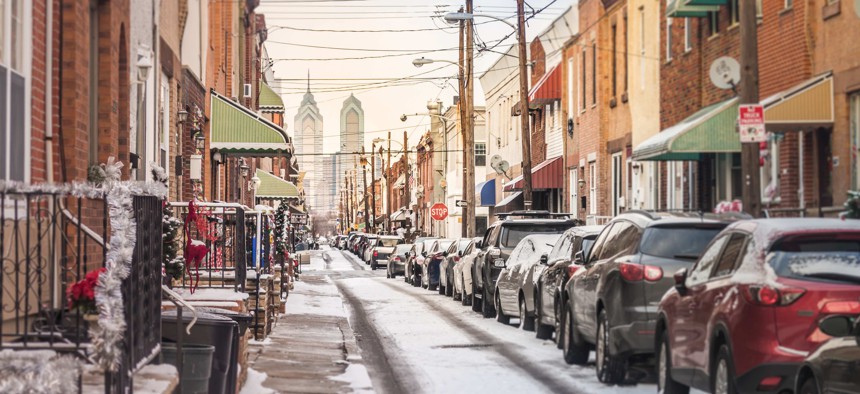City Sued Over Sidewalk Accessibility for People With Disabilities

A snowy street in Philadelphia. Shutterstock

Connecting state and local government leaders
The plaintiffs in the case want Philadelphia to take steps to upgrade ramps and cut down on obstructions.
Philadelphia is violating federal law by failing to provide sidewalks that are easily navigable and safe for people who use wheelchairs and those who are blind, a group of people with disabilities and several organizations allege in a lawsuit filed against the city on Monday.
The suit describes the city’s sidewalks as “dilapidated, disintegrating and teeming with obstructions,” and says Philadelphia is not living up to its obligations to maintain accessible pedestrian rights of way under the federal Americans With Disabilities Act. Enacted in 1990, the law is designed to prohibit discrimination against people with disabilities.
Specifically, the lawsuit claims that people with disabilities deal with curb ramps that are broken, too steep, or missing all together, as well as obstacles such as cars parked on sidewalks and in crosswalks, vendor sandwich boards, trash cans, snow and outdoor furniture.
The suit says the plaintiffs and others routinely fall and sustain injuries due to these sorts of conditions and obstructions, and it outlines incidents where the people who brought the case toppled over in wheelchairs while traveling on city streets.
“My wheelchair has tipped over on multiple occasions because of the disastrous conditions of Philadelphia’s sidewalks,” said Liam Dougherty, a Philadelphia resident and one of the plaintiffs in the case.
“Philadelphia’s failure to create and maintain accessible paths of travel has made it difficult—and, at times, impossible—for me to go to work, school, and church, and has prevented me from being able to fully experience life in Philadelphia,” Dougherty added.
A spokesperson for Philadelphia mayor Jim Kenney’s office said by email Monday that the city had not yet been served with the complaint, but upon receiving it would “review and assess the allegations and the city’s defenses.”
New York City and other localities have faced similar lawsuits in recent years under the Americans With Disabilities Act, over both sidewalk conditions and crosswalk signals.
Four of the plaintiffs in the Philadelphia case are individuals; three of them use wheelchairs and one is blind.
Other plaintiffs include Liberty Resources, an independent living center in Philadelphia that serves people with disabilities, and two groups that advocate on behalf of people who are disabled—Disabled in Action of Pennsylvania Inc. and Philadelphia ADAPT.
They filed the case in the U.S. District Court for the Eastern District of Pennsylvania and are pursuing it as a class action. The plaintiffs are not seeking monetary damages. Instead they are asking the court to order the city to take steps to improve the accessibility of sidewalks and pedestrian rights of way.
Measures they’re calling for include a city evaluation of its sidewalk system, and measures to ensure future sidewalk construction and alterations include features that are fully ADA-compliant.
The lawsuit claims that, in addition to running afoul of the Americans With Disabilities Act, Philadelphia is failing to meet the terms of federal court orders issued in the 1990s that called on the city to install new curb ramps and slopes.
The three organizations said they have attempted in the past to work with Philadelphia officials to address their concerns over the condition of the city’s walkways, but these efforts have failed to adequately address the problems the groups identified.
“For years, we have been urging the city to fix its inaccessible sidewalks,” said Thomas Earle, CEO of Liberty Resources. “It’s disappointing that so long after the passage of the ADA, Philadelphia still violates the civil rights of people with disabilities.”
The city, according to the court complaint, in 2014 estimated that nearly 72,000 curb ramps needed to be upgraded at a cost of $7,500 per ramp, but only planned to allocate $3.2 million each year for these sidewalk improvements.
Disability Rights Advocates, a nonprofit legal center representing the plaintiffs, in July announced that a federal judge approved a settlement that resolved two class action lawsuits over sidewalk accessibility for disabled people in New York City.
Those cases also involved claims that the city was failing to maintain safe curb cuts and sidewalk ramps.
The New York City settlement, which an outside monitor will oversee, requires a citywide survey to identify which corners need curb cuts to be installed or upgraded, and for the city to develop a schedule for completing the improvements at all corners.
Disability Rights Advocates is also providing legal representation in a separate New York City lawsuit seeking crosswalk signal upgrades to improve safety for blind pedestrians. Litigation in that case is still unfolding in federal district court.
A number of groups reached a 2007 settlement agreement with agencies in San Francisco to make crosswalk signal improvements along these lines at no fewer than 80 intersections. And Nassau County, New York was required to make similar crosswalk upgrades, and to take other related measures, as a result of a 2015 court settlement.
Bill Lucia is a Senior Reporter for Route Fifty and is based in Olympia, Washington.

NEXT STORY: Indianapolis steps up its 5G profile





